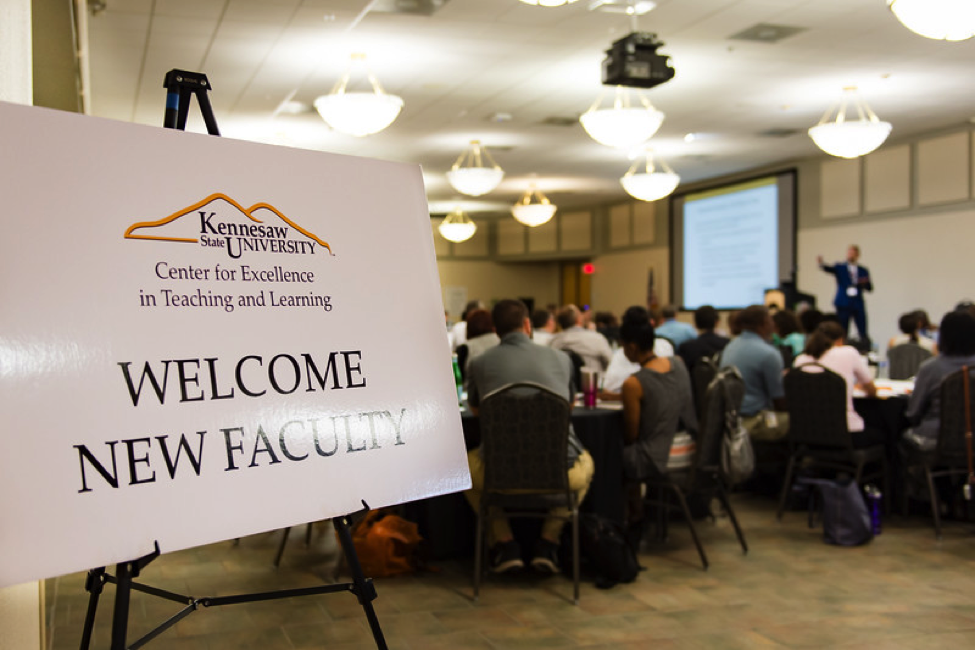by Hillary H. Steiner, Ph.D., Kennesaw State University
Dr. Hillary Steiner is the Interim Associate Director for the Scholarship of Teaching and Learning (SoTL) for the Center for Excellence in Teaching and Learning at Kennesaw State University in Georgia, USA. She is our Summer 2019 guest editor for a blog post series that shares case studies across three institutions. These case studies demonstrate that educational developers can be agents of change within their institutions with respect to supporting the development of metacognition.
How can we ensure students know about metacognition? By promoting it to the faculty who teach them. My students often joke that “metacognition” is my favorite word because they hear it so often in the classroom. The faculty on my campus might be starting to think the same thing, as I integrate the concept into so much of what I do. In my dual role as an educational developer and a faculty member with research interests in the application of educational psychology to higher education, I consider myself a metacognition advocate.
My advocacy for metacognition branches out through all levels of my institution—featuring prominently in the activities of our Center for Excellence in Teaching and Learning and trickling into my own classroom through major assignments as well as everyday conversations with students. It is central to my own Scholarship of Teaching and Learning, as well as the SoTL of many of the faculty members with whom I work. In order for metacognition to take hold in an institution’s culture, we must ensure students and faculty know about its power.

Our university is one of the many who have invited metacognition advocate Dr. Saundra McGuire (McGuire, 2015; 2018) to speak to students and faculty, and the buzz that was created around her visit has generated considerable interest in the concept. Many other colleges and universities have experienced a similar ground swelling of support for the idea’s application to the classroom. Those of us who work in educational development roles can capitalize on this current attention to metacognition by helping faculty who are unfamiliar with the concept realize the importance of a reflective, goal-directed approach to one’s own learning and performance. Ultimately, this advocacy can change the culture of an institution by transforming, in small ways, the way instructors teach and students learn. In this guest blog series on “Working with Faculty to Promote Metacognition,” three authors offer their thoughts on promoting metacognition at the student, faculty, and institutional level through their partnerships with instructors.
First, Dr. Nirmal Trivedi, Director of First-Year Seminars at Kennesaw State University (KSU), writes about the ways in which he helps faculty—many of whom are part-time instructors from outside academia and initially unfamiliar with metacognition—infuse metacognitive practices into their courses, with a goal of changing students’ approaches to studying. First-year seminars at KSU have been transformed to include metacognition as a key focus, which has helped many students successfully navigate the college transition. This transformation earned the program the 2018-19 Momentum Year Award from the University System of Georgia, given to the program that best encourages student achievement in the first year of college.
Second, Valencia Gabay, educational consultant and doctoral student at Indiana Wesleyan University, writes about establishing communities of practice with faculty at a fully online institution to promote metacognition through the instructors’ own reflections on teaching. By focusing on ways the instructors themselves can be metacognitive and using a model from organizational development (Algozzini, Gabay, Voyles, Bessolo, & Batchelor, 2017), she modeled reflective practice in a way that is transferable from instructor to student.
Finally, Dr. Eric Kaldor, Associate Director for the Sheridan Center for Teaching and Learning at Brown University and formerly at the University of Rhode Island (URI), describes the way in which URI took advantage of the buzz surrounding Dr. McGuire’s visit to his campus, creating an institution-wide program that changed the culture of the university at large. Particularly important to this effort was the support and communication provided by various campus partners that made it easier for faculty to understand and implement changes in their curricula.
Readers of this blog series will find useful suggestions to help them ensure that the word gets out about metacognition on their campuses. Educational developers can be agents of change within our institutions because of our relationships with many of the institution’s stakeholders. Through our partnerships with faculty, we have an indirect, but still palpable, influence on student learning (Condon, Iverson, Manduca, Rutz, & Willett, 2016). And as metacognitive practitioners ourselves, we can practice what we preach, engaging in reflective and purposeful analysis of our own messages to the academy about how people learn.
References
Algozzini, L., Gabay,V., Voyles, S., Bessolo, K., & Batchelor, G. (2017). Group coaching and mentoring: A framework for fostering organizational change. Campbell, CA: FastPencil, Inc.
Condon, W., Iverson, E. R., Manduca, C. A., Rutz, C., & Willett, G. (2016). Faculty development and student learning: Assessing the connections. Bloomington, IN: Indiana University Press.
McGuire, S.Y. (2015). Teach students how to learn: Strategies you can incorporate into any course to improve student metacognition, study skills, and motivation. Sterling, VA: Stylus.
McGuire, S.Y. (2018). Teach yourself how to learn: Strategies you can use to ace any course at any level. Sterling, VA: Stylus.